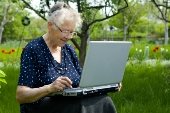Healthy Aging and Learning
Healthy aging and learning go hand-in-hand. Our brains can maintain the ability to focus, remember and grow throughout our lives--if we exercise them!
Brain Plasticity
Scientists used to believe that the adult brain was a fixed, unchanging organ that began losing neurons as early as age 25 in an immutable process that led to inevitable mental decline.
But they were wrong.
In recent years, scientists have discovered that the brain has plasticity, or the ability to grow new neurons throughout our lives.

, Sharon Begley writes that:
The adult brain, in short, retains much of the plasticity of the developing brain, including the power to repair damaged regions, to grow new neurons, to rezone regions that performed one task and have them assume a new task, to change the circuitry that weaves neurons into the networks that allow us to remember, feel, suffer, think, imagine, and dream.
One of the interesting things about plasticity is that our brains respond to the way we use them. They grow more neurons in the regions of the brain that get the most use and shrink the neurons in the regions that get the least use.
For example, Begley says, the brains of violinists have more neurons in the region of the brain that controls the fingering hand than the brains of nonviolin players do.
However, if the violinist stops playing her instrument for a long enough period, the neurons in that region of her brain will begin to shrink.
The Power of Cognitive Exercise
In 2004, the College of Family Physicians of Canada published an article titled Leisure activity and risk of dementia that reported on a study of 469 middle class English-speaking subjects between the ages of 75 and 85.
The study found that:
Generally, subjects who developed dementia were older, had less education, and had significantly lower cognitive-activity scores, but similar physical-activity scores.
In fact, the only physical activity that seemed to have a protective effect against dementia was dancing!
However, numerous cognitive exercises were associated with decreased risk of dementia, particularly when done regularly. Examples used in the study included reading, doing crossword puzzles, and playing board games and musical instruments.
Suggestions for Healthy Aging and Learning
Many activities can help us develop and maintain our cognitive health. Some of the best include:
- Using brain fitness software
- Learning to play a musical instrument
- Learning to speak a foreign language




